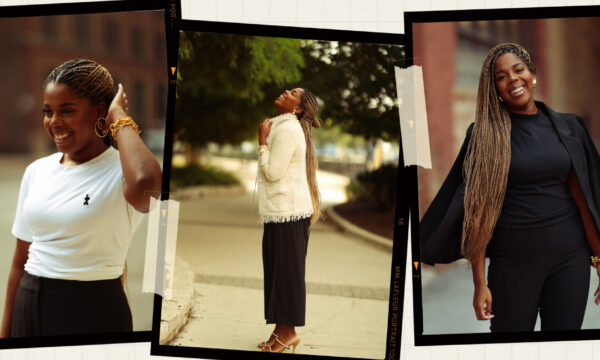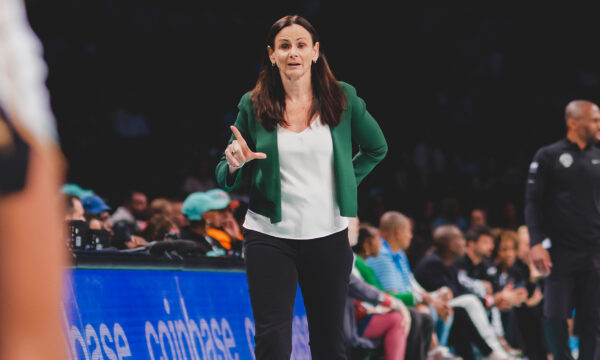
Tashira Halyard and Margo Lindauer Are Here to Remind You That You’re More Than Your Work
The hosts of the justUs podcast on the importance of showing up as your authentic self.
Whether or not you subscribe to the notion of bringing your “whole self” to work, I think we can all agree that the rise of working women embracing their multifaceted identities is something to be celebrated. While far too many organizations remain shamefully inequitable—especially for women of color—it’s increasingly true that you can have a career, be a mother, explore a hobby, experiment with your hair and makeup—and you can count on there being plenty of other women out there who want to discuss these experiences, too.
Last week, as one of the stops along the M.M.LaFleur Roadshow, we hosted Tashira Halyard and Margo Lindauer at our D.C. showroom for a live recording of their podcast, justUs. As close friends, content creators, and former attorneys, Tashira (@politicsandfshn) and Margo (@margo.lindauer) are multi-hyphenates whom we admire for many reasons, including their no-bullshit banter and ability to tackle complex topics with equal parts intellect and humor. We wish our entire community could have attended their event, so we’re sharing highlights from their conversation.
Below, Tashira and Margo open up about being more than their résumés, how they view getting dressed as an act of resistance, and more.
This conversation has been edited for length and clarity.
Want more M Dash?
Sign up for our weekly newsletter.
Thank you!

Shop This Look
On being multi-hyphenates…
Tashira:
“A lot of messaging around workplace decorum is so dated. There’s a Boomer type of model that rolls up into the economic ideal where you get one job, you have one career, you get the house, you do the thing. Then you retire, and then you die. But there’s so much in between it. And starting with us geriatric Millennials, we’re finally understanding we can be multi-hyphenates. We never have to be just one thing.”
Margo:
“I remember, particularly after I had my second child, doing all of these things on the side, outside of work: ordering groceries, pumping, ensuring a babysitter was hired, making sure that our house was paid for. And all the while, I was expected to show up at work like a man, but I didn’t have the privilege of being able to compartmentalize all of these different things in the same way that men do. To me, it’s not possible to be just one thing, or even just three things—especially as a working mother.”
On getting dressed as an act of resistance…
Tashira:
“The thing about me is that I’ve always shown up just as myself as far as my physical presentation. Over 10 years ago, I spent the summer before I met Margo interning in Nigeria and had gotten all of these custom pieces made. I picked out the fabric, and my colleague took me to her tailor. She talked her down on the price, and then a couple of days later, I had all of these custom pieces—one of which was this high-waisted skirt. I was just so fascinated by the whole process. I’d seen a skirt silhouette at J.Crew that I’d liked, so I’d asked if they could replicate it, but make it African. They were like, ‘We can do that.’ Then they had extra fabric, and I remember going back to the States and using it to wrap my hair for work.
I have always felt like bringing my full self and my culture to work was my path to resistance. That’s how @politicsandfshn was born, because I would see my grandma and her sisters, who were all domestic workers their entire lives, dress up. Despite doing that type of physical labor, they still were ‘bad to the bone.’ They would show up to church on a Sunday. My grandma went to town, she always had her lipstick on, and her makeup was always done right. There was this resistance in adornment, and I consciously decided to bring that with me to work. In my mind, I was like, ‘I’m doing the thing that y’all told me I got to do, but I’m going to do it my way.’ And it was in how I presented myself.”
Margo:
“I’ve learned a lot about doing that from you, because I never saw that. I mean, my mom went to work every day for my entire life and always wore a black suit. I now realize that how you show up, how you present yourself for work, has absolutely nothing to do with your work product.”
On asking for permission versus giving yourself permission…
Tashira:
“For a long time, I gave myself permission based on what my grandparents wanted me to do. I am the reflection of the person that my grandparents intended for me to be. I am their hope. I am their dream. My grandmama used to tell me, ‘You said you wanted to be a lawyer when you were four years old. You didn’t even know what they were, but we knew that you could do it.’
It means so much to me to think that my grandparents, who are not formally educated but are educated in a myriad of other ways, were able to get me out of my tiny town. I’m the daughter of two teenage parents, including a father who struggled with substance abuse disorder for years, and they got my ass to Georgetown and got me to two fucking bar exams. So that was the permission that I asked for.
Unfortunately, once I’d checked that box, I got sick. And we lost Xavier, my aunt’s son who I helped to raise. At that point, I was just like, ‘I’m not asking for permission anymore, because I did what I was supposed to do, and I’m actually not any happier. I’m in public interest, so I’m not really making a whole lot of money anyway. There’s no real golden handcuffs. It is my time to define success on my own.’ That’s when I stopped asking, and I started creating and leaning into what I feel like was my purpose.”
Margo:
“I’m still working on it. Obviously Tashira and I come from very different places, but I also have a lot wrapped up into—in my case—my parents being proud of me. My dad is the child of German refugees. Our entire paternal side died in the Holocaust. And my dad went to college and went to law school—did the whole thing.
After college, I went and moved down to North Carolina and was working at a nonprofit, working with homeless families, and I remember calling my dad to tell him how much I loved my job. It was incredible. I speak Spanish, so I had the opportunity to work with newly arrived immigrants in the early 2000s. I was working with the families of farm workers, and it was so fulfilling. I was really, really liking it. But when I called my dad and said, ‘I’m applying to social work school,’ he was like, ‘No, you’re not. You’re applying to law school.’ And I did. I went to law school, and my husband always makes fun of me, because I shit on law school so much, and I’ve been a law professor for the last 12 years. But I’m still like, ‘It was the worst three years of my life.’
I really felt like I lost myself in a lot of ways in law school, but I did it to make my parents happy. I left my job at Northeastern, and now, I get to see my parents every week. I take care of my dad in a lot of ways. I’m his proxy, so I make all of his medical decisions. Every time I see him, he still asks when I’m going back to Northeastern. So I find myself constantly having to reclaim my decisions as the right ones for me and not having to ask for permission. But it’s a hard thing when it’s been ingrained, particularly for women, I think.”
On their non-negotiables…
Margo:
“I would say health. I know that it’s time to reevaluate whenever I start seeing my health falter, which has happened very obviously in some ways over the last couple of years but also more subtly at times. For me, taking care of myself means creating space to do things outside of work and outside of my home. It is very important for me to see friends, and it’s also very important for me to have time with my children that feels fun and not obligatory. It’s also really important to me to take advantage of the fact that I’m able to travel at this point in my life.”
Tashira:
“As I said before, I believe that my presence is an act of resistance. So wherever I go, if I cannot be my authentic self, it is not me that is the problem. It is the institution; it is the establishment. It’s taken a lot of therapy for me to be able to own, accept, and understand this.
Whether we’re talking about signing a contract or hitting the club, I know that many people think I shouldn’t show up and be my country, Southern self. I feel that pressure to code switch or to dress in a particular way or to take out what my partner calls my ‘lesbian piercings,’ and I have to consciously resist the urge to conform. If something about me is bothering someone at an establishment, that is a personal problem that they have. It is not my responsibility to ameliorate it, because at the end of the day, I am going to be me. Those before me sacrificed so much in order for me to be able to sit here in my fullness, in my queerness, in my Blackness, in my womanhood. And that’s just the end of it.”










